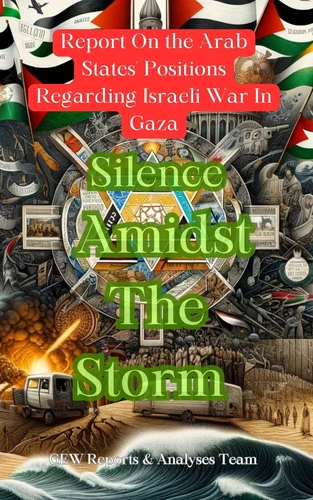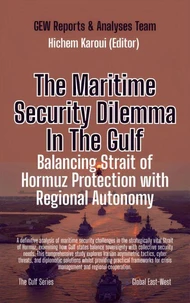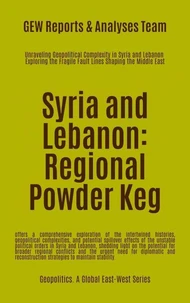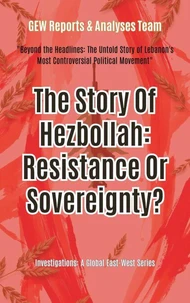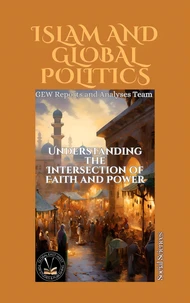Silence Amidst The Storm. Conflits, #1
Par :Formats :
Disponible dans votre compte client Decitre ou Furet du Nord dès validation de votre commande. Le format ePub protégé est :
- Compatible avec une lecture sur My Vivlio (smartphone, tablette, ordinateur)
- Compatible avec une lecture sur liseuses Vivlio
- Pour les liseuses autres que Vivlio, vous devez utiliser le logiciel Adobe Digital Edition. Non compatible avec la lecture sur les liseuses Kindle, Remarkable et Sony
- Non compatible avec un achat hors France métropolitaine
 , qui est-ce ?
, qui est-ce ?Notre partenaire de plateforme de lecture numérique où vous retrouverez l'ensemble de vos ebooks gratuitement
Pour en savoir plus sur nos ebooks, consultez notre aide en ligne ici
- FormatePub
- ISBN978-1-78795-069-6
- EAN9781787950696
- Date de parution10/11/2023
- Protection num.Adobe DRM
- Infos supplémentairesepub
- ÉditeurGlobal East-West LTD
Résumé
Contributions of the Report:- The report provides a comprehensive understanding of the complexities of the Israeli-Palestinian conflict and the role of Arab states in its resolution.- It explores the historical context and individual positions of Arab states, shedding light on their motivations and challenges in achieving a lasting ceasefire.- The report emphasises the need for a nuanced understanding of the historical, political, economic, and social factors at play in order to find a sustainable path to peace.- It highlights the importance of regional alliances, national interests, and engagement with the international community in addressing the obstacles to peace in the Israeli-Palestinian conflict.- The report also discusses the economic challenges faced by countries like Somalia, which limit their ability to contribute to the resolution of the conflict.
Overall, the report contributes to a more informed and enlightened discourse on the Israeli-Palestinian conflict, aiming to pave the way for a brighter and more harmonious future for all those impacted by this enduring struggle. Practical Implications of the Report:- The report provides insights into the motivations, challenges, and perspectives of Arab states in the Israeli-Palestinian conflict, which can inform diplomatic efforts and negotiations.- Understanding the historical, political, economic, and social factors in the conflict can help formulate more effective strategies for achieving a lasting ceasefire and resolution.- Recognising the diverse concerns, interests, and challenges brought by each Arab state to the table can facilitate dialogue and collaboration among regional actors.- Addressing socio-economic factors and alleviating grievances can contribute to stability and create an environment conducive to peace.- The report highlights the need for regional alliances and engagement with the international community to overcome obstacles and work towards a sustainable path to peace.
Overall, the report's practical implications lie in providing a comprehensive understanding of the complexities of the conflict and offering insights that can guide diplomatic efforts, inform policy decisions, and foster collaboration among stakeholders.
Overall, the report contributes to a more informed and enlightened discourse on the Israeli-Palestinian conflict, aiming to pave the way for a brighter and more harmonious future for all those impacted by this enduring struggle. Practical Implications of the Report:- The report provides insights into the motivations, challenges, and perspectives of Arab states in the Israeli-Palestinian conflict, which can inform diplomatic efforts and negotiations.- Understanding the historical, political, economic, and social factors in the conflict can help formulate more effective strategies for achieving a lasting ceasefire and resolution.- Recognising the diverse concerns, interests, and challenges brought by each Arab state to the table can facilitate dialogue and collaboration among regional actors.- Addressing socio-economic factors and alleviating grievances can contribute to stability and create an environment conducive to peace.- The report highlights the need for regional alliances and engagement with the international community to overcome obstacles and work towards a sustainable path to peace.
Overall, the report's practical implications lie in providing a comprehensive understanding of the complexities of the conflict and offering insights that can guide diplomatic efforts, inform policy decisions, and foster collaboration among stakeholders.
Contributions of the Report:- The report provides a comprehensive understanding of the complexities of the Israeli-Palestinian conflict and the role of Arab states in its resolution.- It explores the historical context and individual positions of Arab states, shedding light on their motivations and challenges in achieving a lasting ceasefire.- The report emphasises the need for a nuanced understanding of the historical, political, economic, and social factors at play in order to find a sustainable path to peace.- It highlights the importance of regional alliances, national interests, and engagement with the international community in addressing the obstacles to peace in the Israeli-Palestinian conflict.- The report also discusses the economic challenges faced by countries like Somalia, which limit their ability to contribute to the resolution of the conflict.
Overall, the report contributes to a more informed and enlightened discourse on the Israeli-Palestinian conflict, aiming to pave the way for a brighter and more harmonious future for all those impacted by this enduring struggle. Practical Implications of the Report:- The report provides insights into the motivations, challenges, and perspectives of Arab states in the Israeli-Palestinian conflict, which can inform diplomatic efforts and negotiations.- Understanding the historical, political, economic, and social factors in the conflict can help formulate more effective strategies for achieving a lasting ceasefire and resolution.- Recognising the diverse concerns, interests, and challenges brought by each Arab state to the table can facilitate dialogue and collaboration among regional actors.- Addressing socio-economic factors and alleviating grievances can contribute to stability and create an environment conducive to peace.- The report highlights the need for regional alliances and engagement with the international community to overcome obstacles and work towards a sustainable path to peace.
Overall, the report's practical implications lie in providing a comprehensive understanding of the complexities of the conflict and offering insights that can guide diplomatic efforts, inform policy decisions, and foster collaboration among stakeholders.
Overall, the report contributes to a more informed and enlightened discourse on the Israeli-Palestinian conflict, aiming to pave the way for a brighter and more harmonious future for all those impacted by this enduring struggle. Practical Implications of the Report:- The report provides insights into the motivations, challenges, and perspectives of Arab states in the Israeli-Palestinian conflict, which can inform diplomatic efforts and negotiations.- Understanding the historical, political, economic, and social factors in the conflict can help formulate more effective strategies for achieving a lasting ceasefire and resolution.- Recognising the diverse concerns, interests, and challenges brought by each Arab state to the table can facilitate dialogue and collaboration among regional actors.- Addressing socio-economic factors and alleviating grievances can contribute to stability and create an environment conducive to peace.- The report highlights the need for regional alliances and engagement with the international community to overcome obstacles and work towards a sustainable path to peace.
Overall, the report's practical implications lie in providing a comprehensive understanding of the complexities of the conflict and offering insights that can guide diplomatic efforts, inform policy decisions, and foster collaboration among stakeholders.

